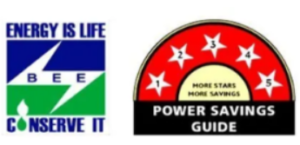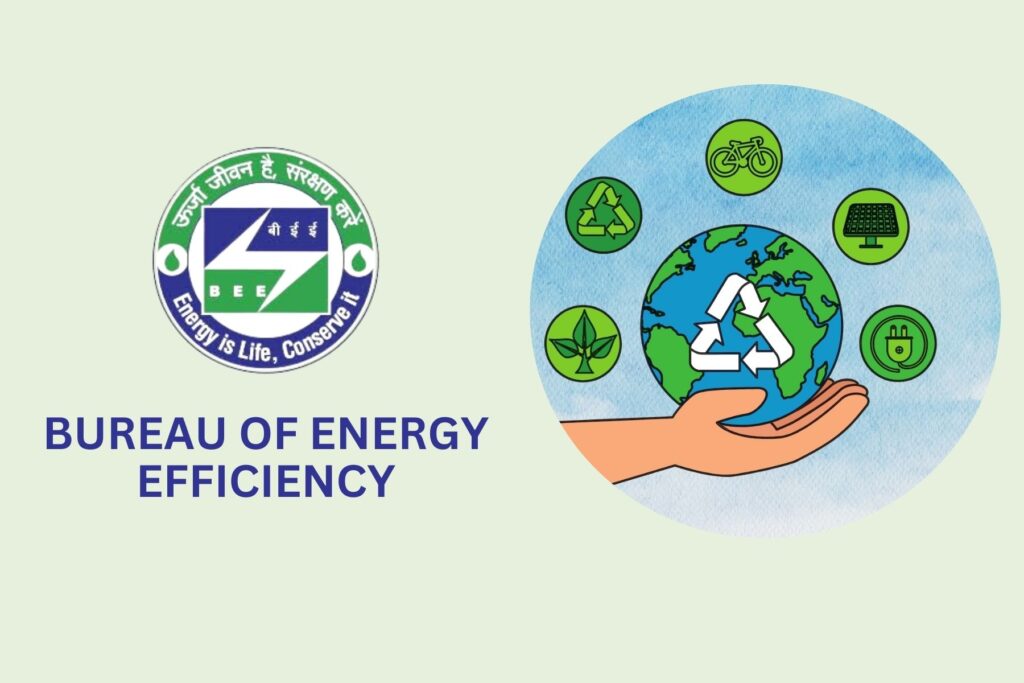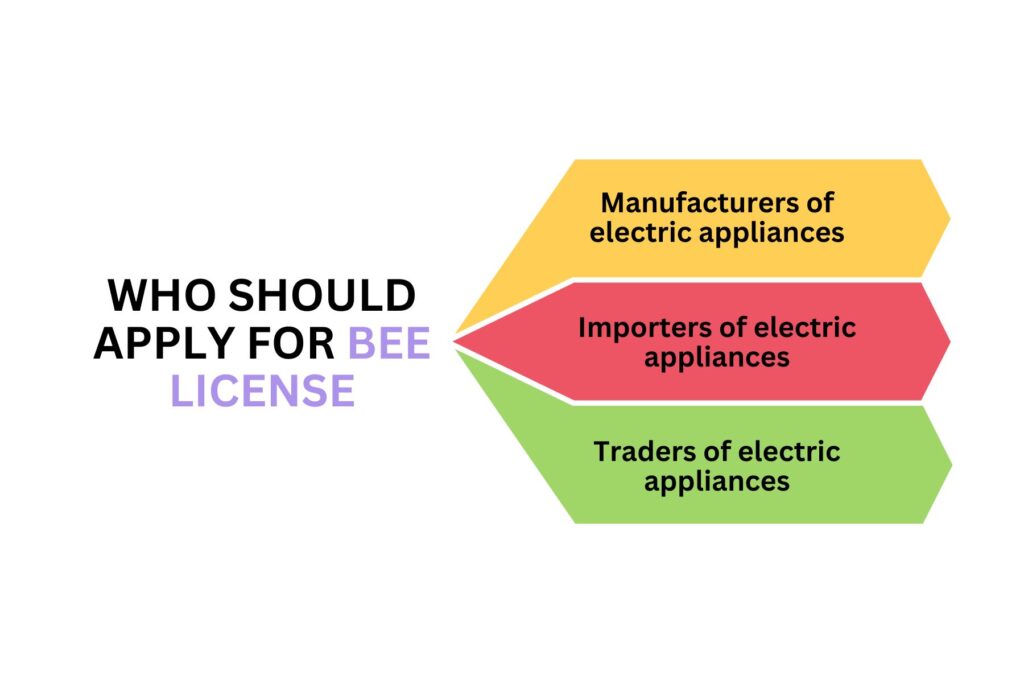BEE Registration For Energy Consuming Products


The Bureau of Energy Efficiency (BEE), established by the Government of India under the Energy Conservation Act, 2001, plays a pivotal role in promoting energy efficiency and conservation across various sectors of the economy. Here's a breakdown of its vision, mission, and key strategies:
Vision:
The vision of BEE is to improve the energy intensity of the Indian economy, thereby contributing to sustainable development.
Mission:
Develop Policies and Strategies: BEE aims to develop policies and strategies that emphasize self-regulation and market principles. These policies are framed within the Energy Conservation Act, 2001, with the primary objective of reducing energy intensity in the Indian economy.
Stakeholder Participation: BEE seeks active participation from all stakeholders to accelerate and sustain the adoption of energy efficiency practices in all sectors.
Energy Conservation Programs: BEE plans, manages, and implements energy conservation programs mandated by the Energy Conservation Act.
Leadership and Policy Framework: BEE assumes leadership in providing policy frameworks and directions for national energy efficiency and conservation efforts.
Public-Private Partnership (PPP): BEE promotes energy efficiency through innovative delivery mechanisms, including PPPs, to demonstrate effective energy conservation practices.
Monitoring and Verification: BEE establishes robust systems and procedures to measure, monitor, and verify energy efficiency results at both sectoral and national levels.
International Collaboration: BEE leverages support from multilateral, bilateral, and private sector entities to implement energy efficiency programs effectively.
Awareness Promotion: BEE actively promotes awareness campaigns to educate stakeholders about the benefits of energy savings and conservation.
Strategies:
- Policy Development: Formulating policies and programs for efficient energy use.
- Implementation of Energy Conservation Programs: Executing initiatives outlined in the Energy Conservation Act.
- Leadership in Energy Efficiency: Providing guidance and direction to national efforts.
- PPP Models: Collaborating with private entities for effective energy efficiency projects.
- Monitoring and Evaluation: Ensuring accountability through monitoring and verification mechanisms.
- International Engagement: Engaging with global partners for knowledge exchange and support.
- Public Awareness: Educating the public and stakeholders about energy conservation benefits.
By focusing on these strategies, BEE aims to achieve significant reductions in energy intensity and promote sustainable development across India's economy.
Function and Duties
The Bureau of Energy Efficiency (BEE), established under the Energy Conservation Act, 2001, performs a variety of functions and duties aimed at both regulatory and promotional aspects of energy efficiency and conservation in India.
Regulatory Functions:
Standards and Labelling: BEE develops minimum energy performance standards (MEPS) for equipment and appliances under the Standards and Labelling program. This helps consumers make informed choices based on energy efficiency ratings.
Commercial Buildings Standards: BEE sets MEPS for energy performance in commercial buildings, aiming to improve energy efficiency in the built environment.
Energy Consumption Norms: BEE establishes norms for energy consumption by designated consumers, which include large industries, establishments, and sectors mandated to comply with energy efficiency norms.
Certification of Energy Managers and Auditors: BEE certifies energy managers and auditors who play crucial roles in managing and auditing energy use in various sectors.
Accreditation of Energy Auditors: BEE accredits energy auditors to ensure quality and competency in conducting energy audits.
Mandatory Energy Audits: BEE specifies the manner and periodicity of mandatory energy audits for designated consumers, ensuring compliance with energy efficiency requirements.
Promotional Functions:
Awareness and Information Dissemination: BEE creates awareness among consumers, industries, and the public about energy efficiency benefits and practices through various campaigns and initiatives.
Training Programs: BEE organizes training programs to educate personnel and specialists in energy-efficient techniques and practices.
Consultancy Services: BEE strengthens consultancy services in the field of energy efficiency to assist industries and organizations in adopting efficient energy practices.
Research and Development: BEE promotes research and development in energy efficiency technologies and practices to foster innovation and improvement.
Testing and Certification: BEE develops testing and certification procedures and promotes testing facilities to ensure compliance with energy efficiency standards.
Pilot and Demonstration Projects: BEE formulates and facilitates the implementation of pilot projects and demonstration projects to showcase and promote energy-efficient technologies and solutions.
Promotion of Energy Efficiency: BEE encourages the use of energy-efficient processes, equipment, devices, and systems through incentives and awareness programs.
Preferential Treatment: BEE advocates for preferential treatment for energy-efficient equipment and appliances to encourage their adoption in the market.
Innovative Financing: BEE promotes innovative financing mechanisms for energy efficiency projects to overcome financial barriers and encourage investments in energy-saving technologies.
Financial Assistance: BEE provides financial assistance to institutions and organizations to promote the efficient use of energy and conservation practices.
Educational Curriculum: BEE develops educational curricula on energy efficiency and conservation to integrate these principles into academic and vocational training.
International Cooperation: BEE implements international cooperation programs to share knowledge, experiences, and best practices in energy efficiency and conservation on a global scale.
What is BEE Registration?
BEE registration refers to the process of registering with the Bureau of Energy Efficiency (BEE) in India for various programs and certifications related to energy efficiency. BEE, established under the Energy Conservation Act, 2001, implements initiatives aimed at reducing energy consumption and promoting energy efficiency across different sectors of the economy.
Types of BEE Registrations:
1.Standards & Labelling (Star Labeling):
- Manufacturers of appliances and equipment such as refrigerators, air conditioners, televisions, washing machines, etc., can register their products with BEE for star labeling.
- This registration involves compliance with minimum energy performance standards (MEPS) and testing procedures specified by BEE. Products are then assigned star ratings (like 1-star, 2-star, etc.) based on their energy efficiency.
2.Energy Conservation Building Code (ECBC) Registration:
- ECBC sets minimum energy efficiency standards for new commercial buildings or major renovations.
- Builders and developers can register their buildings with BEE to certify compliance with ECBC standards.
3.Energy Managers & Auditors Certification:
- Individuals aspiring to become certified energy managers or auditors must register for examinations conducted by BEE.
- Certification involves passing the designated examination and fulfilling specific criteria set by BEE to demonstrate competency in managing or auditing energy use.
4.Designated Consumer Registration:
- Large energy-consuming industries and establishments categorized as “designated consumers” under the Energy Conservation Act must register with BEE.
- These consumers are required to comply with energy consumption norms, conduct mandatory energy audits, and report energy usage to BEE.
5. Energy Efficiency Projects Registration:
- Organizations implementing energy efficiency projects can register these projects with BEE.
- Registration may be necessary for availing financial incentives or demonstrating compliance with energy efficiency norms. Overall, BEE registration plays a crucial role in promoting energy efficiency, reducing energy consumption, and enhancing sustainability across various sectors of the Indian economy.

MANDATORY PRODUCT LIST
S.No. | Product Name | Indian Standard |
| Mandatory Appliances |
|
1 | Frost-Free Refrigerators | IS 15750, Schedule – 1 |
2 | Stationary Storage Type Electric Water Heater / Electric Geysers | IS 2082, Schedule – 10 |
3 | Colour Television ( Color TV / Smart TV ) | IS 616, IS 13384 (Part 1 and Part 2) and IS 13900 for CRT’s, Schedule – 11 |
4 | Room Air Conditioner (Variable Speed / Fixed Speed) | IS 1391 Part 1 and Part 2, Schedule – 3 |
5 | Tubular Fluorescent Lamps | IS 2418 Part 1 and Part 2, Schedule – 2 |
6 | LED Lamps | IS 16102 Part 2, IS 16106 and 14700 (Part 3 / Sec 2), Schedule – 20 |
7 | Room Air Conditioners (Cassette, Floor Standing Tower, Ceiling, Corner AC) | IS 1391 Part 2, Schedule – 3A |
8 | Distribution Transformer | IS 1180 Part 1, IS 2026 (Part1, Part 2 and Part 3) and IS 2500 Part-1, Schedule – 4 |
9 | Direct Cool Refrigerators | IS 1476 Part 1, Schedule – 5 |
10 | Ceiling Fans | IS 374 and Schedule 8 |
| Voluntary Products |
|
1 | Computer (Notebook / Laptops) | Schedule 14 |
2 | Domestic Liquefied Petroleum Gas(LPG) Stoves | IS 4246 and Schedule 9 |
3 | General Purpose Industrial Motor ( Induction Motors ) | IS 15999, IS 12615 and Schedule 6 |
4 | Submersible Pump Set / Agricultural Pump Sets | IS 9079, IS 8034, IS 14220, IS 11346 and Schedule 7 |
5 | Washing Machine (Semi/Top Load/Front Load) | IS 302-2-7, IEC 60456 and Schedule 12 |
6 | Ballast (Electronic / Magnetic) | IS 1534-1, IS 13021, IS 15885-2-8, IS 14700-3-2, IS16873-5 and Schedule 15 |
7 | Solid State Inverter | IS 13314 and Schedule 17 |
8 | Office Automation Products ( Printer, Copier, Scanner, MFD ) | Schedule 16 |
9 | Diesel Engine Driven Monoset Pumps for Agricultural Purposes | Schedule 13 |
10 | Diesel Generator Set | IS 10000, IS 10001, IS 13364, IS 4889 and Schedule 18 |
11 | Chillers | IS 16590 and Schedule 21 |
12 | Microwave Ovens | IS 302-2-25, IEC60705 and Schedule 22 |
13 | Solar water Heater | IS 12933, IS 16368, IS 16544 and Schedule 23 |
14 | Deep Freezers | IS 7872 and Schedule – 25 |
15 | Light Commercial AC Fixed Speed | IS 1391 (Part 2) |
16 | Ultra-High Definition (UHD) Televisions | IS 616, IEC 62087 |
17 | Air Compressors | IS 5456 |
18 | Tyres/Tires | IS 15633 |
19 | High Energy Li-Battery | ISO 12405- Part (4) |
|
|
|
Timeline for BEE Registration
- For Model Registration : 25-30 working days.
VALIDITY AND RENEWAL
The BEE Registration remains valid for 3 years and renewal will be required before the expiry date.

